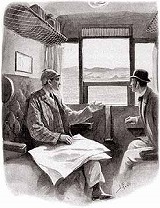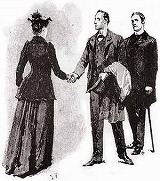
“They always fill me with a certain horror. It is my belief, Watson, founded upon my experience, that the lowest and vilest alleys in London do not present a more dreadful record of sin than does the smiling and beautiful countryside.”
“You horrify me!”
“But the reason is very obvious. The pressure of public opinion can do in the town what the law cannot accomplish. There is no lane so vile that the scream of a tortured child, or the thud of a drunkard’s blow, does not beget sympathy and indignation among the neighbours, and then the whole machinery of justice is ever so close that a word of complaint can set it going, and there is but a step between the crime and the dock. But look at these lonely houses, each in its own fields, filled for the most part with poor ignorant folk who know little of the law. Think of the deeds of hellish cruelty, the hidden wickedness which may go on, year in, year out, in such places, and none the wiser. Had this lady who appeals to us for help gone to live in Winchester, I should never have had a fear for her. It is the five miles of country which makes the danger. Still, it is clear that she is not personally threatened.”
“No. If she can come to Winchester to meet us she can get away.”
“Quite so. She has her freedom.”
“What can be the matter, then? Can you suggest no explanation?”
“I have devised seven separate explanations, each of which would cover the facts as far as we know them. But which of these is correct can only be determined by the fresh information which we shall no doubt find waiting for us. Well, there is the tower of the cathedral, and we shall soon learn all that Miss Hunter has to tell.”
The Black Swan is an inn of repute in the High Street, at no distance from the station, and there we found the young lady waiting for us. She had engaged a sitting-room, and our lunch awaited us upon the table.

“I am so delighted that you have come,” she said earnestly. “It is so very kind of you both; but indeed I do not know what I should do. Your advice will be altogether invaluable to me.”
“Pray tell us what has happened to you.”
“I will do so, and I must be quick, for I have promised Mr. Rucastle to be back before three. I got his leave to come into town this morning, though he little knew for what purpose.”
“Let us have everything in its due order.” Holmes thrust his long thin legs out towards the fire and composed himself to listen.
“In the first place, I may say that I have met, on the whole, with no actual ill-treatment from Mr. and Mrs. Rucastle. It is only fair to them to say that. But I cannot understand them, and I am not easy in my mind about them.”
“What can you not understand?”
“Their reasons for their conduct. But you shall have it all just as it occurred. When I came down, Mr. Rucastle met me here and drove me in his dog-cart to the Copper Beeches. It is, as he said, beautifully situated, but it is not beautiful in itself, for it is a large square block of a house, whitewashed, but all stained and streaked with damp and bad weather. There are grounds round it, woods on three sides, and on the fourth a field which slopes down to the Southampton highroad, which curves past about a hundred yards from the front door. This ground in front belongs to the house, but the woods all round are part of Lord Southerton’s preserves. A clump of copper beeches immediately in front of the hall door has given its name to the place.